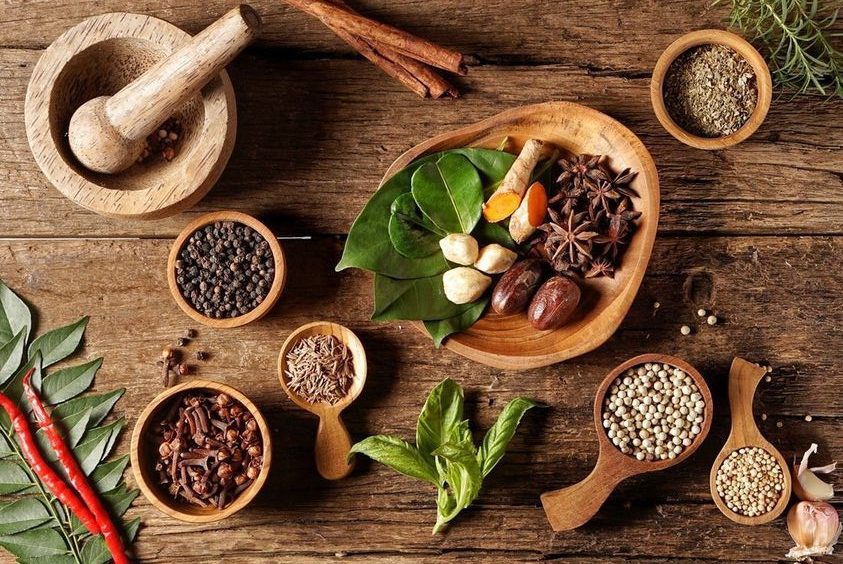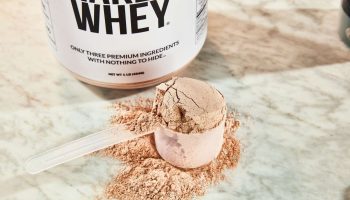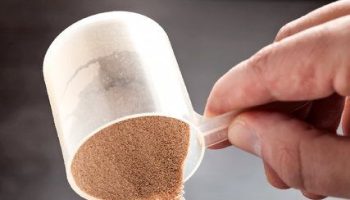Introduction
Herbs in simple terms means – the products from natural vegetation or plants, such as the leaves, the roots, the flowers, and sometimes even the bark. India has a rich tradition of using herbs for a variety of reasons:
- Improve the taste of the food
- Can be used as food garnishing
- Can be used as preservatives
- Have medicinal value
- Have minimal side-effects
- Are cheap
- Are freely available around us
- Improve immune function
- Increase energy
- Mood Boosters

We can use these herbs in our daily dietary intakes and wellness routines. Some of the herbs that can prove to be a boon for our body are basil, rosemary, turmeric, cinnamon, ginger, cardamom, and so on. Herbs have transformative powers that not only boost our energy, make us feel relaxed, or lose weight. These herbs are cure-alls or a panacea cure for many ills and difficulties.
As put forward beautifully by Rosalee de la Forêt, in her book – Alchemy of Herbs, “Herbs are the bridge between nature and healing” – herbal remedies are profound cords or connections between nature and human wellbeing.
Now, we shall expand our ideas on the benefits of Herbal remedies by visiting those benefits again. Let us delve deeper into those benefits.
Benefits of Herbs and Herbal Remedies:-
- Improve the taste of the food: When it comes to culinary art and herbs, the two always go hand-in-hand because of the simple fact that many of us rely on natural vegetation for our daily nutritional intake, that is, we are vegetarians. Culinary herbs are herbaceous plants that can add flavor, aroma, and color to all types of meals. Herbs such as coriander and mint not only add taste to our food but can enhance its nutritional value. We have an age-old tradition of using herbs in our daily routine food products. When we are stuck in low-fat or low-salt foods that taste bland, we can use herbs to enhance the flavor of virtually any dish, including desserts. We use mostly the leaf part in our meals when we want to use herbs in the food. We can use these leaves as fresh or dried.
- Can be used for food garnishing: The part of the plant, that is usually dried, is typically called a spice. Some of the examples include:
- Bay/basil leaves (leaf): Can be added to tomato sauces, potato dishes, rice, egg dishes, etc. for garnishing.
- Barks (cinnamon): Can be added for garnishing rice dishes, soups, casseroles, etc.
- Berries (peppercorns): Can be used for garnishing pizzas and cakes.
- Seeds (fenugreek seeds): Can be used for garnishing South Indian dishes such as upma and some vegetables.
- Roots (ginger): Can be used for garnishing cakes, biscuits, etc.
- Flowers (chamomile): Can be added to curries, seafood, tea, etc.
- Buds (cloves): Can be added to salads, sausages, meat, fish, etc.
- Stigmas of flowers (saffron): Can be used for garnishing desserts.

These spices can be added to our food which not only bring flavor but can also add a spark to the otherwise bland or tasteless food without adding additional salt, oil, or sugar. Moreover, these spices have their health-enhancing properties. All these spices can be used for garnishing a variety of food items, such as rice, desserts, curd products, puddings, and so on. When we garnish the salad with those flowers and micro shoots it becomes simply out of this world.
- Can be used as preservatives: How can we use certain herbs as preservatives? Well, here is how we can do so.
- Basil: Basil has therapeutic ingredients in the form of leaves which can used in food items. The essential oils can be extracted from basil leaves can be used as a preservative, or additive.
- Ginger: Ginger juice can extend the food products’ shelf life for a couple of days when kept at room temperature. This becomes possible because of the vitamin C content present in it and its preservative properties.
- Cinnamon: Cinnamon can be a marvelous antioxidant. It has anti-bacterial properties that can be used as a natural preservative in many foods, especially fruit-made foods such as jams, squashes, canned juices, etc. Cinnamon can help fruit products from rotting and discoloration.
- Cumin: Cumin is known for its antimicrobial properties that can prevent bacteria and other microorganisms from growing in food items.
- Oregano: Oregano oil can kill bacteria and yeast from growing. It is one of the best food preservatives available in terms of herbs.
- Have medicinal value: Using herbs not only prevents lifestyle diseases such as diabetes but also can prove to be heaven in preventing chronic diseases such as cardiovascular diseases and cancer. Using herbs can also be useful for reducing blood clots, helping prevent inflammatory feelings in the stomach, and fighting long-lasting tumor disease. Many studies have come up showcasing the medicinal value of these herbs. Some of the findings of those studies are:
- Some of the herbs that help fight against cancer are Garlic, onions, chives, leeks, mint, basil, oregano, sage, and many other herbs.
- Some of the herbs help lower cholesterol. Some examples of these magical herbs are Garlic, linseed, fenugreek, and lemongrass.
- Many times, garlic is suggested by physicians for people with symptoms such as mild blood pressure.
- Other diseases such as fenugreek can help control blood sugar and insulin activity. Additionally, herbs such as linseed, flaxseed, and cinnamon can help fight diabetes because of their medicinal value.
- Have minimal side-effects: Because many of these herbs are grown and found naturally and available in n natural environment, these bear minimum side effects on the human body. Herbs are though used as medicines, but they should never replace the medicines that our doctor has prescribed. These medicines are simply dietary supplements that take care of our bodies and reduce the risk of catching a disease. Sometimes the herbs can have negative side effects on the human body such as allergic reactions and rashes, asthma, headaches, nausea, vomiting, diarrhea, dizziness, dry mouth, and seizures. Before we use any herbal medicine, we should talk with our doctor or physician. We should ask for guidance on all the medicines we plan to take. They will assist us in making sure the herbal medicine is safe for our health. Some herbs are unsafe to take with other medicines.
- Are cheap: Since herbs are freely available around us, the herbs are evenly priced. And consequently, when we talk of medicines, they are made from herbs; thus, very moderately priced. It is essential to be cognizant of the herbs we are using. The quality of herbs also matters. Some herbal medicine-making companies add fillers, which make these herbal supplements cheaper. But adding filters may not work as well. Or they may cause any of the side effects aforesaid. Even if herbal medicines are natural, they may not be safe.
- Are freely available around us: The herbs or plant products, we see around us, are freely available around us. We can grow some of these herbs in our backyard as well. Herbs such as coriander, and mint are freely available and can be grown in our gardens. Other herbs like some flowers such as chamomile can be grown in homes too.
- Improve immune function: Many herbs contain ingredients that not only help balance the immune response but can also help thwart illness and boost recovery from injury or disease.
- Increase energy: Herbs can increase energy by nourishing, warming, and circulating the body’s inner vitality. Many herbs act as antioxidants such as cloves, cinnamon, sage, oregano, and thyme. These herbs acting as antioxidants shield the human body cells from the impairment instigated by free radicals. Free radicals are nothing but uneven molecules made by the process of oxidation during regular metabolism in the human body. Free radicals may cause cancer, heart disease, stroke, and other diseases of aging. It is believed that fresh herbs habitually are rich in antioxidant levels as compared to processed or dried herbs. We should opt for herbs to enhance our health. We should also aim to add these fresh herbs at the end of cooking or as we serve to preserve these properties.
- Mood Boosters: Turmeric has an antioxidant called Curcumin, which not only helps improve mood but also relieves mild symptoms of depression by fighting chronic inflammation.

A Word of Caution!
When using herbs as medicines we must be very careful as these herbal remedies are a type of dietary supplement and they are not medicines. We should know that herbals are not regulated like medicines from FSSAI in India or FDA and USDA in the US. Herbals may not work as claimed as the labels on them are not approved by any authority. Thus, they may not list the correct amount of an ingredient. Sometimes these herbals may contain elements or contaminants that will not be listed on their labels. So I would like you to check our topic on Top 10 Herbal Products Manufacturing Companies in India so that you will get the best herbal products for better health.
Summary
Herbals can make us feel the best and can help us keep healthy. Some of the advantages of using herbal products are:
- Have minimum side effects. Herbal medicine is a naturally and freely available entity so our bodies might respond to it positively.
- May help in self-healing. These medicines have a deeper effect than prescription drugs which usually just mask the issue.
- Can help improve overall health, like mood swings, depression, immune system, etc.
- Can save money.
But we need to be a smart consumer. We should always talk to our physician before using any of the herbal medicines.







